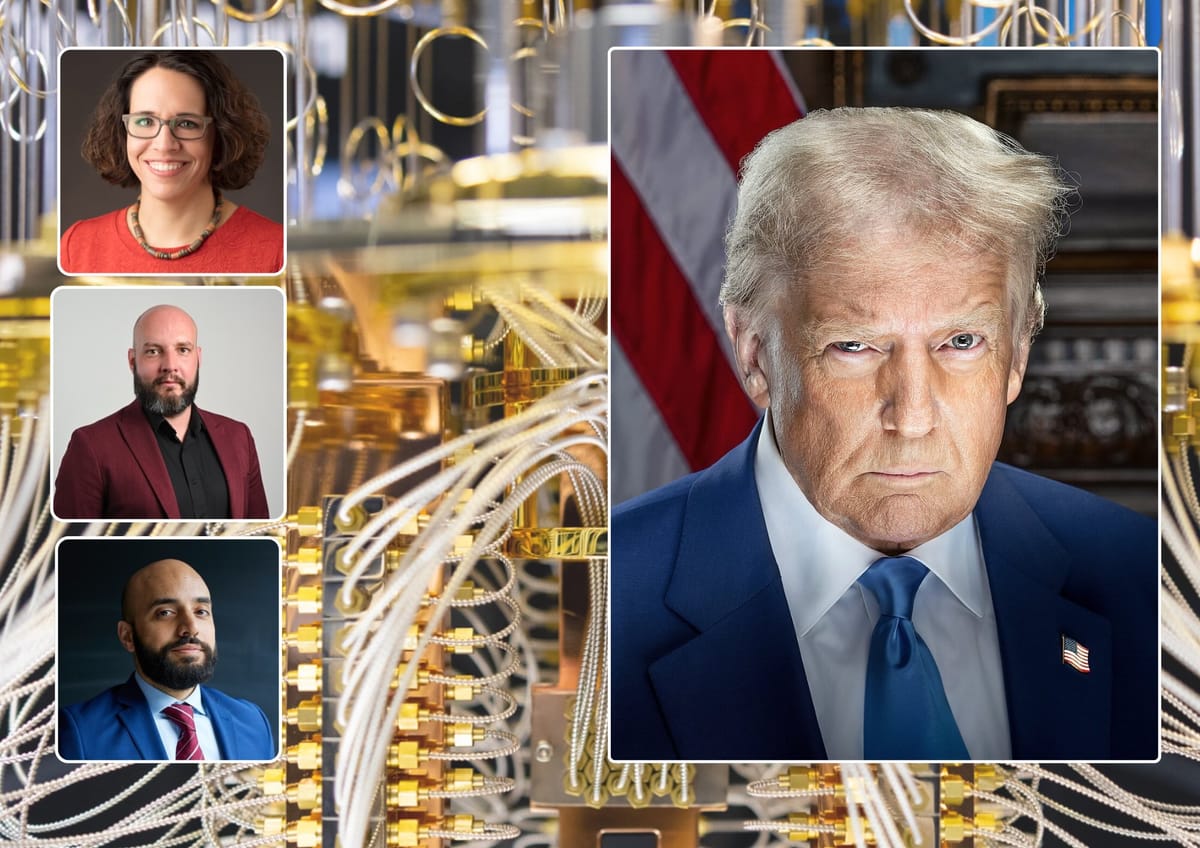How will Donald Trump's tariffs impact the quantum sector?
"Anything which stokes the geopolitical tensions that already exist in the world will keep us up at night."

One minute he's hot. The next minute, he's cold. Unless the topic is China, of course, in which case President Donald Trump is always blowing fire.
The world has been on tenterhooks for the past few weeks as the White House plays a "will he, won't he" game with tariffs. One minute, he's hitting close allies with reciprocal tariffs of up to 20% - although Britain was spared with a relatively modest 20%.
The next moment, everything's fine again, the charges are suspended, and all is once again sort of well with the world. Except if you're China, which seems to be almost certainly looking at tariffs of 145%.
Trump pickers will recognise this trademark approach: start with an apparently bonkers position, then pull back and eventually meet in the middle, which was where he always wanted to be. The President set out this strategy in the Art of the Deal and has followed it ever since.
Followers who call him things like God Emperor Trump describe it as "4D chess"; other folks see it as a pain in the bum.
So how will the chaos impact the quantum sector, which is in its relative infancy - or perhaps adolescence - and working hard to reach full maturity?
One analyst has warned that tariffs will hike up the price of tech such as cryogenic systems, specialised optics, and ultra-pure materials. The delays caused by extra red tape could also have security implications as the world rushes to implement post-quantum protections.
Is there anything to worry about, or should we, in the famous words of QAnon, trust the plan?
We spoke to three UK-based quantum pioneers to find out. Thanks to TFD for introducing us.
Andrei Dragomir, Co-Founder & CEO of quantum-sensing startup Aquark Technologies:
"I am concerned not about what the tariffs mean themselves, but on the potential consequences of those tariffs being imposed. We are already limited on how fast we can go by our supply chain and how fast we can outsource. Additionally, we already saw the impact of Covid on semiconductor deployment.
"We’re using microchips to control some of the lasers in our technology - simple things like turning them on and off. But it needs to be done with very high precision.
"There was a time when these were available for next-day delivery. Then, we reached a point where there was a six to eight-month wait for a single component, if it was available at all. That is causing me a bit of worry in terms of direct application.
"In the UK, the supply chain is not fully developed, so we’re relying quite a lot on what we can get from outside the country. If every nation starts putting in these types of barriers, it’s going to hurt us as a startup.
"We live in short periods of time depending on how much money you have in the bank until you get to that stable revenue curve. It could reduce the lifespan by a little or a lot - we don’t know - but it always sits in the back of our heads. That’s the main concern.
"As a company, we embrace the dual-use aspect of our quantum tech. We received financial support from the Nato Innovation Fund. So anything that stokes the geopolitical tensions that already exist in the world is keeping us up at night. It’s something we need to monitor closely as a company, because it could directly affect what we’re trying to achieve."
Read more about Aquark in our interview with Andre entitled Commercialising the "second quantum revolution"
Dr Ramy Shelbaya, Chief Executive Officer of Quantum Random Number Generation (QRNG) firm Quantum Dice:

"I wish quantum technologies were at a level where tariffs would be our biggest concern. Fundamentally, unless tariffs evolve into an all-out actual trade war with import and export restrictions on all sorts of non-essential components - which, by the way, is not exactly inconceivable - I doubt they will have any tangible impact.
"The adopters of quantum technology are not particularly price sensitive, and the supply chain itself is relatively slow, so a slowdown - a tariff slowdown - isn’t going to be that noticeable.
"What could impact quantum is that most companies in the space are startups and any additional red tape imposed by these tariffs might not be as easy for them to absorb or deal with as it would be for a larger company.
"But fundamentally, the biggest concern is if we are headed towards import and export restrictions, which has the potential to be challenging for startups, especially in countries that don’t have a self-sufficient supply of components. In the UK, for example, that could become an issue, but hopefully it won’t get that far."
Mandy Birch, adviser to the UK's National Quantum Computing Centre and Founder & CEO of TreQ, a manufacturer of open-architecture quantum computing clusters:

"There’s not a whole lot of impact right now because the supply chains are not very mature. We have opportunities to source components. There’s a lot of innovation happening around the world, so we have a lot of opportunities to be flexible in how we source and build them.
"We’re already seeing a lot of the demand for on-premise systems driven by geopolitics and technical sovereignty goals. The clients we’re working with were already quite concerned about trying to source quantum computers locally. It’s happening here in the UK, and the government is encouraging the development of the supply chain, so there’s a technological sovereignty component.
"Many countries in Europe - not just Europe as a whole, but individual countries -are working towards technological sovereignty as well. We consider where we would source the technology from as an additional factor we take into account when recommending to a client as we’re building a bespoke system.
"I think this adds a bit of complexity to the decision, because it may not only be the best technically performing technology, but also: can it be sourced from the local supply chain? What are the costs?
"I agree the majority of buyers right now are not particularly cost-sensitive. They know this is early stage and that there’s a lot of risk, so there’s already some margin built in to account for that.
"In these early days of tariffs, we don’t see a direct impact, other than it’s annoying and every little thing can be disruptive to a startup. But we have the agility to navigate, whereas larger companies with well-established supply chains are going to see much bigger impacts than we are."
Have you got a story or insights to share? Get in touch and let us know.




